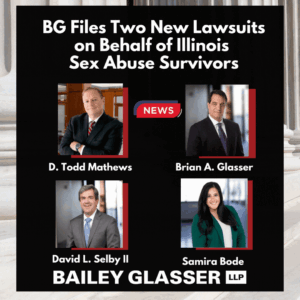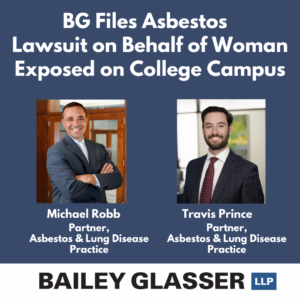 Did you know that lung cancer can be caused by asbestos exposure at schools, universities, or hospitals? Bailey & Glasser, LLP recently filed an asbestos lawsuit in West Virginia on behalf of a 63-year-old nonsmoker who was diagnosed with lung cancer after being exposed to asbestos on a college campus and while working in various hospitals as a nursing student.
Did you know that lung cancer can be caused by asbestos exposure at schools, universities, or hospitals? Bailey & Glasser, LLP recently filed an asbestos lawsuit in West Virginia on behalf of a 63-year-old nonsmoker who was diagnosed with lung cancer after being exposed to asbestos on a college campus and while working in various hospitals as a nursing student.
BG partners Michael Robb and Travis Prince filed the complaint on behalf of Donna Spurling in Kanawha County Circuit Court against Fairmont State University and several West Virginia hospitals including Monongalia County General Hospital, United Hospital Center, and Fairmont Regional Medical Center.
Our Complaint alleges Ms. Spurling was exposed to building materials containing asbestos regularly in buildings on her college campus and at various hospitals while a nursing student at Fairmont State from 1998-2004. The Complaint details the history of asbestosis, saying the danger of asbestos dust to result in the potentially fatal lung disease was recognized in medical and scientific circles by the early 1930s, and includes details about how Metropolitan Life worked to hide the dangers of asbestos.
“Defendants had actual knowledge of the dangers to Donna R. Spurling of asbestos exposure, nevertheless, defendants deliberately, intentionally and purposefully withheld such information,” the Complaint stated.
Bailey Glasser’s Asbestos & Lung Disease practice is at the forefront of the fight for people poisoned by asbestos and other carcinogens and has years of experience representing individuals exposed to asbestos in both industrial and non-industrial settings such as schools and hospitals.
To learn more about this lawsuit, read the West Virginia Record article here.
For more about Mickey and his experience, visit here.
For more about Travis and his experience, visit here.
For more on our Asbestos & Lung Disease Practice, visit here.

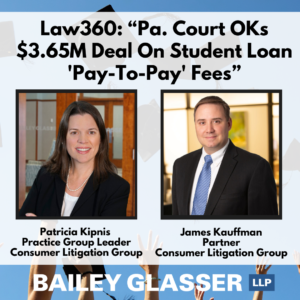 BG secured approval for a $3.65 million settlement in a class action before a Pennsylvania federal district court on behalf of federal student loan borrowers charged illegal fees just for paying their monthly loan payments online or over the phone.
BG secured approval for a $3.65 million settlement in a class action before a Pennsylvania federal district court on behalf of federal student loan borrowers charged illegal fees just for paying their monthly loan payments online or over the phone.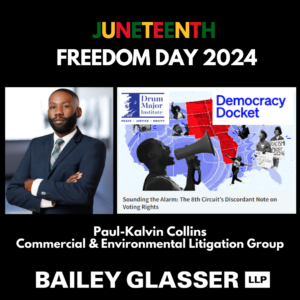 Join Bailey & Glasser, LLP in celebrating Juneteenth Freedom Day 2024.
Join Bailey & Glasser, LLP in celebrating Juneteenth Freedom Day 2024.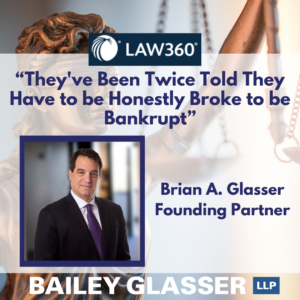
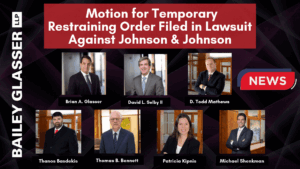
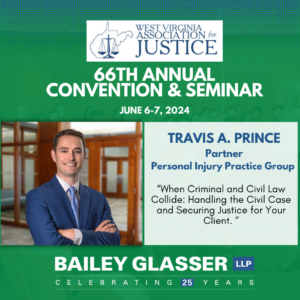 BG partner,
BG partner, 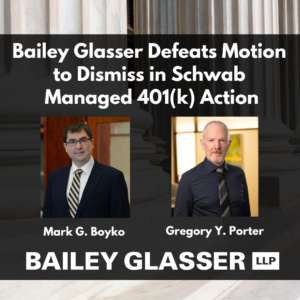 BG secured an important win for employee participants of the Vituity and MedAmerica 401(k) retirement plan. On Friday, U.S. District Court Judge Richard Seeborg of the Northern District of California ruled on a motion to dismiss filed by CEP America and the MedAmerica Retirement & Benefits Committee, which oversees the 401(k) plan offered to employees and retirees of Vituity and MedAmerica. In his ruling denying the motion in part, Judge Seeborg noted that the Complaint alleges that the fees charged by recordkeepers to other 401(k) plans “were multiples less than those charged” by Schwab.
BG secured an important win for employee participants of the Vituity and MedAmerica 401(k) retirement plan. On Friday, U.S. District Court Judge Richard Seeborg of the Northern District of California ruled on a motion to dismiss filed by CEP America and the MedAmerica Retirement & Benefits Committee, which oversees the 401(k) plan offered to employees and retirees of Vituity and MedAmerica. In his ruling denying the motion in part, Judge Seeborg noted that the Complaint alleges that the fees charged by recordkeepers to other 401(k) plans “were multiples less than those charged” by Schwab.